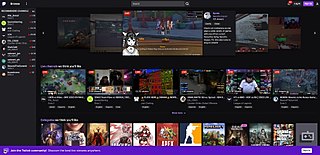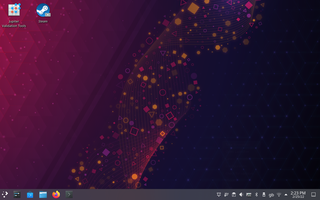
Blizzard Entertainment, Inc. is an American video game developer and publisher based in Irvine, California. A subsidiary of Activision Blizzard, the company was founded in February 1991 as Silicon & Synapse, Inc. by three graduates of the University of California, Los Angeles: Michael Morhaime, Frank Pearce and Allen Adham. The company originally concentrated on the creation of game ports for other studios' games before beginning development of their own software in 1993, with games like Rock n' Roll Racing and The Lost Vikings. In 1993, the company became Chaos Studios, Inc., and then Blizzard Entertainment soon after being acquired by distributor Davidson & Associates early in the following year. Shortly after, Blizzard released Warcraft: Orcs & Humans.

Nvidia Corporation is an American multinational technology company, incorporated in Delaware and based in Santa Clara, California. It is a software and fabless company which designs graphics processing units (GPUs), application programming interface (APIs) for data science and high-performance computing as well as system on a chip units (SoCs) for the mobile computing and automotive market. Nvidia is a dominant supplier of artificial intelligence (AI) hardware and software. Its professional line of GPUs are used in workstations for applications in such fields as architecture, engineering and construction, media and entertainment, automotive, scientific research, and manufacturing design.

Steam is a video game digital distribution service and storefront developed by Valve Corporation. It was launched as a software client in September 2003 to provide game updates automatically for Valve's games, and expanded to distributing third-party titles in late 2005. Steam offers various features, like game server matchmaking with Valve Anti-Cheat measures, social networking, and game streaming services. Steam client's functions include game update automation, cloud storage for game progress, and community features such as direct messaging, in-game overlay functions and a virtual collectable marketplace.

Activision Blizzard, Inc. is an American video game holding company based in Santa Monica, California. Activision Blizzard currently includes five business units: Activision Publishing, Blizzard Entertainment, King, Major League Gaming, and Activision Blizzard Studios.

Battle.net is an Internet-based online game, social networking service, digital distribution, and digital rights management platform developed by Blizzard Entertainment. The service was launched on December 31, 1996, followed a few days later with the release of Blizzard's action-role-playing video game Diablo on January 3, 1997. Battle.net was officially renamed to "Blizzard Battle.net" in August 2017, with the change being reverted in January 2021.

Raptr was a social-networking website and instant messenger developed by Raptr, Inc. intended for use by video game players. Dennis Fong, co-founder of Xfire, founded the company Raptr, Inc. in 2007; it is located in Mountain View, California. The company raised 12 million dollars in funding from investors including Accel Partners and Founders Fund. The service was shut down on September 30, 2017.
Gaikai is an American company which provides technology for the streaming of high-end video games. Its technology has multiple applications, including in-home streaming over a local wired or wireless network, as well as cloud-based gaming where video games are rendered on remote servers and delivered to end users via internet streaming
Cloud gaming, sometimes called gaming on demand or game streaming, is a type of online gaming that runs video games on remote servers and streams the game's output directly to a user's device, or more colloquially, playing a game remotely from a cloud. It contrasts with traditional means of gaming, wherein a game is run locally on a user's video game console, personal computer, or mobile device.

Twitch is an American video live streaming service that focuses on video game live streaming, including broadcasts of esports competitions, in addition to offering music broadcasts, creative content, and "in real life" streams. Twitch is operated by Twitch Interactive, a subsidiary of Amazon.com, Inc. It was introduced in June 2011 as a spin-off of the general-interest streaming platform Justin.tv. Content on the site can be viewed either live or via video on demand. The games shown on Twitch's current homepage are listed according to audience preference and include genres such as real-time strategy games (RTS), fighting games, racing games, and first-person shooters.

The Nvidia Shield Portable is a handheld game console developed by Nvidia, released on July 31, 2013. The console runs on Android Lollipop 5.1, featuring a flip 130mm (5-inch) touchscreen display with 1280×720 resolution. The device is similar in shape to an Xbox 360 controller and similar in control setup to a DualShock controller, with two analog joysticks, a D-pad, and other buttons. It is the first device to use Nvidia's Tegra 4 processor. It was originally called Shield or Nvidia Shield, but since the launch of the Shield Tablet, it is called the Shield Portable. Due to being out of stock for many years, it is thought to be discontinued, but there has not yet been any official announcement from Nvidia.

SteamOS is a Linux distribution developed by Valve. It incorporates Valve's popular namesake Steam video game storefront and is the primary operating system for Steam Machines and the Steam Deck. SteamOS is open source with some closed source components.

The Nvidia Shield TV is an Android TV-based digital media player produced by Nvidia as part of its Shield brand of Android devices. First released in May 2015, the Shield was initially marketed by Nvidia as a microconsole, emphasizing its ability to play downloaded games and stream games from a compatible PC on a local network, or via the GeForce Now subscription service. As with all other Android TV devices, it can also stream content from various sources using apps, and also supports 4K resolution video. It is produced in two models, with the second Shield TV Pro model distinguished primarily by increased internal storage.

The Overwatch League (OWL) was a professional esports league for the video game Overwatch, produced by its developer, Blizzard Entertainment. From 2018 to 2023, the Overwatch League followed the model of other traditional North American professional sporting leagues by using a set of permanent, city-based teams backed by separate ownership groups. The league used the regular season and playoffs format rather than promotion and relegation used commonly in other esports and non-North American leagues, with players on the roster being assured a minimum annual salary, benefits, and a portion of winnings and revenue-sharing based on team performance.
Game Pass is a subscription service as part of Xbox and offered by Microsoft Gaming. Launched on June 1, 2017, the service allows users to download and play video games for Xbox video game consoles or Microsoft Windows PCs from a rotating library, with the games remaining accessible as long as the user has an active subscription. Game Pass subscribers also receive discounts on purchases of games from the service's library and their respective downloadable content (DLC).
LiquidSky was a New York City–based provider of cloud visualization, acquired by Walmart in 2018. The company's flagship product was a cloud gaming service of the same name, launched on March 24, 2017, and shut down in 2018. Announced at Consumer Electronics Show 2017, the service aimed to tackle issues that other providers struggle with, including latency and input lag. Its major competitors include Sony's PlayStation Now and NVIDIA's GeForce Now for PC and Mac.

Stadia was a cloud gaming service developed and operated by Google. Known in development as Project Stream, the service debuted through a closed beta in October 2018, and publicly launched in November 2019. The service was to compete with Sony's PlayStation Plus cloud streaming, Nvidia's GeForce Now, Amazon's Luna, and Microsoft's Xbox Cloud Gaming. Stadia initially received a mixed reception from reviewers, with most criticism directed at its limited library of games and lack of promised features. Google had initially intended to develop in-house games in addition to hosting games produced by third parties, but abandoned this plan in February 2021, shutting down its studios. The service continued to sell third party games, and Google offered the game-streaming technology as a white-label product. Google announced in September 2022 that it would be shutting down Stadia; the service went offline permanently on January 18, 2023, at 11:59 pm PST.

Xbox Cloud Gaming is a cloud gaming service as part of Xbox offered by Microsoft Gaming. Initially released in beta testing in November 2019, the service later launched for subscribers of Xbox Game Pass Ultimate on September 15, 2020. Xbox Game Pass cloud gaming is provided to subscribers of Ultimate at no additional cost. Xbox Cloud Gaming operates by linking the device to a remote server in the cloud.

Warcraft III: Reforged is a remastered edition of the 2002 real-time strategy video game Warcraft III: Reign of Chaos and its expansion The Frozen Throne. Released on January 28, 2020, it adds revamped graphics, new campaign gameplay settings as well as modern online Battle.net features. The game received mixed reviews from critics and an overwhelmingly negative reception from players for its changes from the original, the lack of many announced features and technical issues.

The Backbone One is an attachable game controller for iOS devices. Both the controller and the Backbone iOS app are created by Backbone. The app acts as a social hub and allows for editing and sharing recorded gameplay through social media platforms.

Microsoft Gaming is a multinational video game and digital entertainment division of Microsoft. Microsoft Gaming produces the Xbox brand of video game consoles and services, in addition to overseeing the production, game development, publishing, research and development, sales of Xbox and the division's three subsidiaries (publishers) worldwide. The three subsidiaries consist of: Xbox Game Studios, ZeniMax Media, and Activision Blizzard, each publish games under their own respective labels. CEO Phil Spencer, who has concurrently overseen the Xbox brand since 2014, is the leader of the division.
















